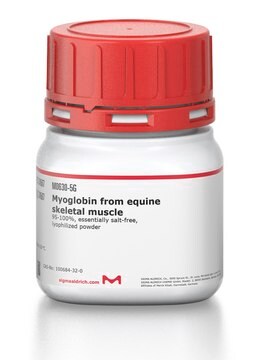MABC006F
Mouse IgG2b Negative Control, clone GC198, FITC conjugate
Mouse IgG2b Negative Control Monoclonal Antibody validated for use in Flow Cytometry & Immunofluorescence.
Se connecterpour consulter vos tarifs contractuels et ceux de votre entreprise/organisme
About This Item
Code UNSPSC :
12352203
eCl@ss :
32160702
Nomenclature NACRES :
NA.42
Produits recommandés
Source biologique
mouse
Niveau de qualité
Conjugué
FITC conjugate
Forme d'anticorps
purified immunoglobulin
Clone
GC198, monoclonal
Fabricant/nom de marque
Chemicon®
Technique(s)
flow cytometry: suitable
immunofluorescence: suitable
Isotype
IgG2b
Conditions d'expédition
wet ice
Modification post-traductionnelle de la cible
unmodified
Spécificité
This antibody reacts with the outer membrane protein of some strains of Neisseria gonorrhoeae. No reaction with human cell surface or plasma components has been observed. However, some binding to Fc receptors may occur.
Immunogène
Protein I preparation from Neisseria gonorrhoeae.
Application
FITC conjugated mouse IgG2b is a monoclonal antibody intended for use as a negative control in flow cytometry. Its use enables an estimation of non-specific binding of mouse monoclonal antibodies to cell surface components in peripheral blood and tissue.
SUGGESTED USAGE
Flow cytometry - use 10 μl direct from the vial per 100 μl of whole blood, or 1 x 10E6 peripheral blood mononuclear cells (PBMC) in 100 μl buffer.
SUGGESTED USAGE
Flow cytometry - use 10 μl direct from the vial per 100 μl of whole blood, or 1 x 10E6 peripheral blood mononuclear cells (PBMC) in 100 μl buffer.
Mouse IgG2b Negative Control Monoclonal Antibody validated for use in Flow Cytometry & Immunofluorescence.
Research Category
Secondary & Control Antibodies
Epitope Tags & General Use
Secondary & Control Antibodies
Epitope Tags & General Use
Research Sub Category
Isotype Control Antibodies
Isotype Control Antibodies
Forme physique
Purified immunoglobulin. Fluorescein conjugated, ready to use. The antibody is supplied in 1.0ml phosphate buffered saline, pH 7.4, containing 0.2% bovine serum albumin and 0.1% sodium azide. The characteristics of each lot are tested by electrophoresis and flow cytometry.
Stockage et stabilité
Store at 2 to 8oC, for up to 6 months. DO NOT FREEZE. Protect from light.
WARNING
The monoclonal reagent solution contains 0.1% sodium azide as a preservative. Due to potential hazards arising from the build up of this material in pipes, spent reagent should be disposed of with liberal volumes of water.
WARNING
The monoclonal reagent solution contains 0.1% sodium azide as a preservative. Due to potential hazards arising from the build up of this material in pipes, spent reagent should be disposed of with liberal volumes of water.
Informations légales
CHEMICON is a registered trademark of Merck KGaA, Darmstadt, Germany
Clause de non-responsabilité
Unless otherwise stated in our catalog or other company documentation accompanying the product(s), our products are intended for research use only and are not to be used for any other purpose, which includes but is not limited to, unauthorized commercial uses, in vitro diagnostic uses, ex vivo or in vivo therapeutic uses or any type of consumption or application to humans or animals.
Code de la classe de stockage
12 - Non Combustible Liquids
Classe de danger pour l'eau (WGK)
WGK 2
Point d'éclair (°F)
Not applicable
Point d'éclair (°C)
Not applicable
Certificats d'analyse (COA)
Recherchez un Certificats d'analyse (COA) en saisissant le numéro de lot du produit. Les numéros de lot figurent sur l'étiquette du produit après les mots "Lot" ou "Batch".
Déjà en possession de ce produit ?
Retrouvez la documentation relative aux produits que vous avez récemment achetés dans la Bibliothèque de documents.
Narges Labibzadeh et al.
Cell journal, 18(3), 302-309 (2016-09-08)
Nonunion is defined as a minimum of 9 months since injury without any visible progressive signs of healing for 3 months. Recent literature has shown that the application of mesenchymal stromal cells is safe, in vitro and in vivo, for
Passaging and colony expansion of human pluripotent stem cells by enzyme-free dissociation in chemically defined culture conditions.
Beers, J; Gulbranson, DR; George, N; Siniscalchi, LI; Jones, J; Thomson, JA; Chen, G
Nature Protocols null
Vivek Shukla et al.
Cancer research, 77(22), 6267-6281 (2017-09-25)
In this study, we generated induced pluripotent stem cells (iPSC) from normal human small airway epithelial cells (SAEC) to investigate epigenetic mechanisms of stemness and pluripotency in lung cancers. We documented key hallmarks of reprogramming in lung iPSCs (Lu-iPSC) that
Notre équipe de scientifiques dispose d'une expérience dans tous les secteurs de la recherche, notamment en sciences de la vie, science des matériaux, synthèse chimique, chromatographie, analyse et dans de nombreux autres domaines..
Contacter notre Service technique